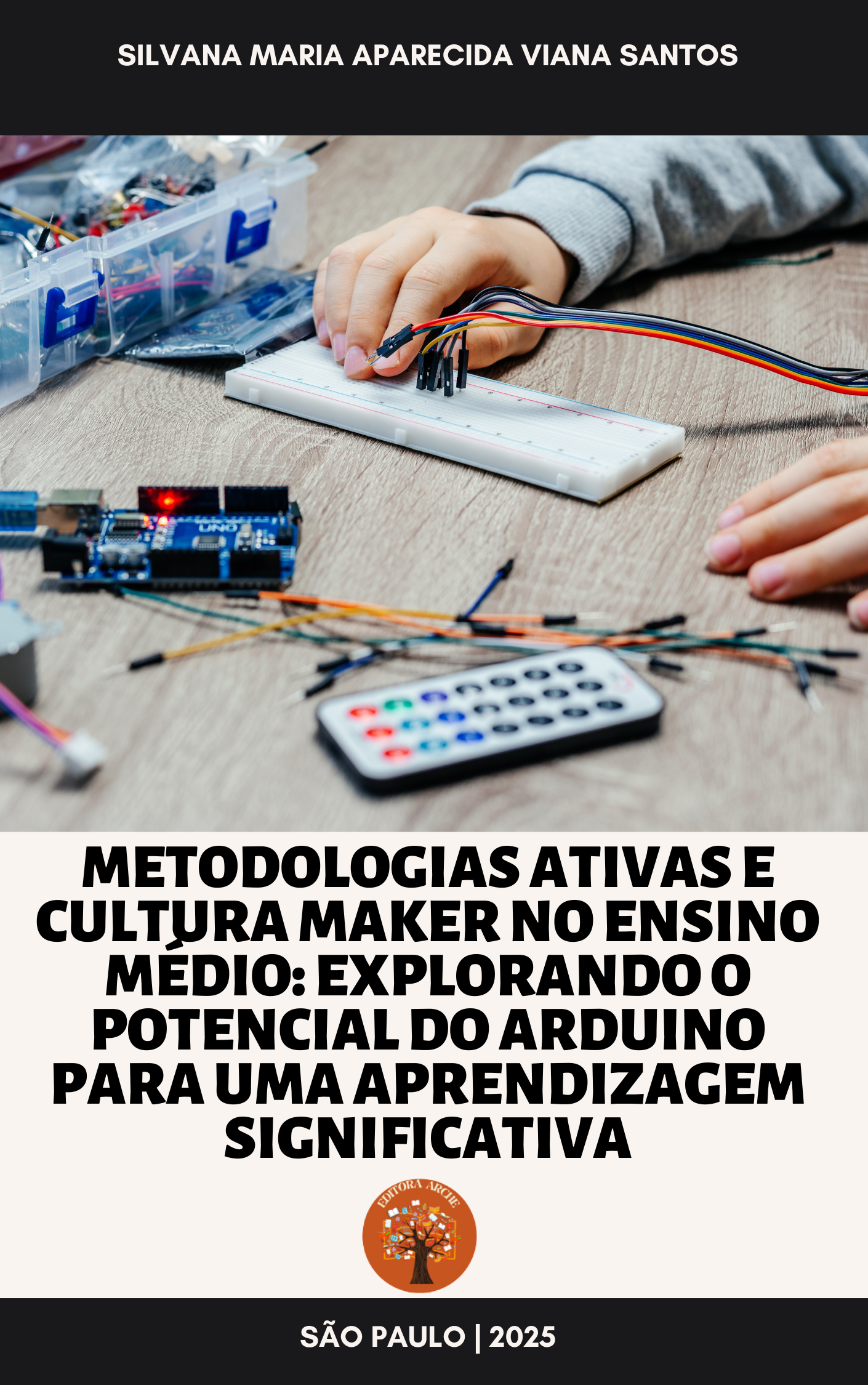ACTIVE METHODOLOGIES AND MAKER CULTURE IN HIGH SCHOOL: EXPLORING THE POTENTIAL OF ARDUINO FOR MEANINGFUL LEARNING
Keywords:
Active Methodologies. Arduino. Maker Education. High School. Educational Technologies.Abstract
High school, as the final stage of basic education, plays a fundamental role in the education of young people, preparing them to face the challenges of the contemporary world and to continue their academic or professional career. At this level of education, it is essential to adopt pedagogical practices that go beyond the transmission of content, prioritizing the development of essential skills and abilities for the 21st century.
Active methodologies emerge as an innovative approach in this scenario, placing the student at the center of the teaching-learning process and encouraging their active participation, autonomy, and protagonism. According to Bacich and Moran (2018), these methodologies promote meaningful learning by integrating theory and practice, and stimulate critical thinking and problem-solving skills through dynamic and contextualized activities.
In this context, Maker Culture, based on the concept of ‘do it yourself’, stands out as a practice that values experimentation, creativity, and collaboration. Dias et al. (2024) define Maker Culture as an educational movement that connects students to real problems, encouraging them to build practical and interdisciplinary solutions through the use of accessible technologies, such as Arduino. This approach enhances learning by aligning theory, practice and innovation, contributing to the education of young people prepared for the technological and social challenges of contemporary times.
The use of accessible technologies, such as the Arduino microcontroller, enhances this approach, allowing students to develop technical and creative skills through collaborative and interdisciplinary projects. This perspective contributes to an education that is connected to the real world and capable of engaging students in a meaningful way (Murr et al., 2020).
Despite the recognized advantages of active methodologies and the Maker movement, their implementation in high school faces significant challenges. Many teachers find it difficult to integrate these practices into the formal curriculum, either due to the lack of material and technological resources or due to limitations in teacher training to deal with the demands of Maker teaching. Therefore, it is important to explore the opportunities and challenges of this approach in using Arduino as a pedagogical tool, in order to better understand its contributions to high school education.
In view of this, this study seeks to answer the following question: what are the challenges and opportunities in using active methodologies with the Arduino microcontroller in Maker classes in high school? This question is based on the assumption that innovative pedagogical practices can transform traditional education, promoting interdisciplinary and practical learning that prepares students to face complex problems of contemporary life.
The justification for this research is anchored in the need to adapt the educational system to the demands of the 21st century. The traditional teaching model often fails to engage students or develop essential skills, such as creativity, critical thinking, and problem-solving skills. In this context, the Maker movement and the use of Arduino offer a transformative approach, integrating theory and practice in an accessible and collaborative way. By investigating these practices, this study seeks to contribute to the advancement of active methodologies and teacher training, proposing solutions to overcome the challenges of implementation in high school.
The general objective of this research is to analyze the challenges and opportunities in the use of active methodologies with the Arduino microcontroller in Maker classes in high school. To this end, the following specific objectives were established: To investigate the use of Arduino in Maker projects in the context of high school students' learning. To analyze the potentialities and limitations of active methodologies associated with the Maker culture in promoting meaningful and interdisciplinary learning. To present examples of Maker projects with Arduino that can be applied in the high school classroom, exploring how these projects can develop technological and creative skills.
To achieve these objectives, a qualitative approach will be adopted, based on bibliographic research and documentary analysis. The research will be based on a bibliographical survey on active methodologies in Maker education and the use of Arduino as an educational technology. Scientific articles, books and official documents, such as the National Common Curricular Base (BNCC), will be analyzed to identify guidelines that support the inclusion of innovative practices in the high school curriculum. Case studies of schools or projects that use Arduino in Maker activities will also be investigated, with the aim of mapping the benefits and challenges faced by teachers and students. Finally, examples of practical activities that can be implemented in high school will be proposed, discussing how these activities foster collaborative learning and the development of essential skills. This work begins with the methodological approach used to support the research. The evolution of traditional education to innovative practices is discussed, with emphasis on the impacts of the Covid-19 pandemic as a transformative milestone. Next, emerging technologies in education are explored, with an emphasis on teacher training and the guidelines of the National Common Curricular Base (BNCC). The study also examines the role of digital information and communication technologies as catalysts for pedagogical change. In the part dedicated to the development of the research, the application of Maker Culture in High School, the use of Arduino as an educational tool and projects that contribute to strengthening logical thinking are analyzed. The work concludes with a summary of the results obtained and final reflections on the potential and challenges of the practices investigated.
Downloads

Downloads
Published
How to Cite
License
Atribuição CC BY
